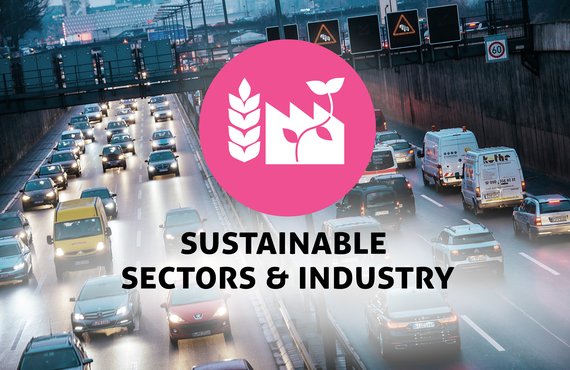
Sustainable Industry & Sectors
Service > Enable resilient, circular, and healthy industries
The industrial revolution left us with a radically different world, with its benefits and problems. Today, we find that the supply chains we rely on for vital resources are ancient, inefficient, and fragile. Luckily, there are plenty of options to start producing our food, products, and energy in much better ways, working with supply chains and learning from nature.
We guide our partners in this process, focusing on the entire supply chain, and on creating value for individual organizations, and society at large.
Towards healthy, resilient, and circular industries
The sustainability of production systems are one of the main challenges facing our economy. How we make our food, provide for water, energy, and other basic needs is a fundamental question for the future. Since 1999, Except develops custom made services to help industry and sector partners to analyze, optimize, and improve production, with short term benefits and impact improvement, and long term transition towards circular, resilient industries.
We stand by partners in a wide variety of industries to support their transition, step by step, towards a better future. By approaching this from the perspective of the entire life cycle, and with a long term view in mind, we achieve unparalleled results.
Matthew Leroy of IKEA:
“The results have been beyond our expectations. In the first year, [our] energy consumption dropped 8%, while CO2 emission went down 2%. That may sound modest, but with a print run that has an energy footprint the size of the entire South Carolina economy, this adds up to 285,000 barrels of oil left in the ground each year from now on, and the CO2 emissions of 155,000 car kilometers compensated for by IKEA’s CO2 savings. Plus, these reductions have only just started to kick in and are accelerating.
Where to start?
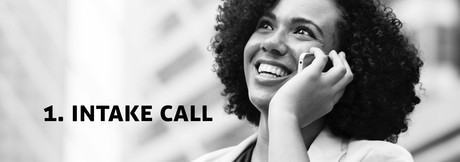
If you're not sure where to start, wish to discuss in more detail what your organizational needs are, or simple have some questions, book in an intake call with us, free of charge and without obligation.
In this call with one of our experts, we discuss with you what you think the direction is you'd like to go, what you need, and what you hope to achieve. From this we can advise you on what useful next steps are.
Contact jeroen@except.nl to arrange an intake call, or for more information.
Specific Industry Services
- Roadmaps for sustainable industries
Planning and executing the transition of production from linear to circular, from A to Z. - Sustainable Agriculture & Food production
Advanced strategies, concepts, and technologies for sustaineble, efficient food production anywhere in the world, including vertical and urban agriculture.
General Industry Services
- Sustainability Strategy
What options lie before you, and what are the smart steps to take into the future? What is the competition up to, and how to best respond and position your own trajectory? - Impact Assessment & Sustainability Reporting
Where does your organization impact society the most, and where are the opportunities? What is the best and most efficient way to arrive at transparent sustainability reporting? - Circular Economy & Systems Analysis
Services to head towards a fully circular economy organization, as well as performing broader systems analysis for understanding, analyzing, and strategizing towards a sustainable organization. - Supply Chain Optimization
Optimize your orgenization's impacts through the supply chain; map the chain, find leverage points, and boost organziational performance with smart tools and strategies. - Stakeholder Involvement
Involve your stakeholders upstream, downstream and across society to leverage higher performance, and combine this with industry leadership. - Training and Knowledge Development
Train your staff, sustainability tream or individuals in our various sustainability programs, for beginners to experts.
Program services
Our approach focuses on improving entire supply chains, from cradle to grave. Strategies include:
- Circular economy
- Bio-based economy
- Natural Capital (& accounting)
- Supply and value chain analysis
- Systems mapping
- Sector road maps
- Resource resilience
Food specific strategies
For the food sector we have additional strategies that focus on:
- Food security & Food diversity
- Greenhouse production systems & Polyculture Greenhouse production systems
- Sustainable agriculture systems
- Socially embedded agriculture
- Urban agriculture
Why work with Except?
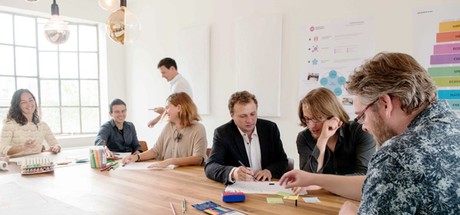
Except started in 1999, one of the first consultancies in this field. In the two decades that followed, we've supported more than 100 organizations on their pathway towards sustainable operations. This experience helps like no other stand by you along the way.
We work a wide variety of sectors,including large multinationals on four continents, such as IKEA and Heineken, as well as with small local organizations, minicipalities, and family businesses. We carry over this experience to you.
"Except offers a flexible and complementary team of experts in different fields that together create magic."
- Matthieu Leroy, Inter IKEA Systems
We help you choose and walk down pathways that not only increase your organization's sustainability performance, but help you flourish as well.
Because that's what we feel sustainability is all about: to flourish as organizations while contributing to a sustainable society.
Examples
Polydome
Polydome is a revolutionary approach to greenhouse agriculture that offers the possibility of commercial scale, net-zero-impact food production. The Polydome system strategically interweaves a wide variety of crops and animals, taking advantage of every inch of the greenhouse while eliminating the need for synthetic fertilizers and pesticides.
Polydome is an answer to a part of the world food crisis. With its high yields (60 – 90 kg per square meter), and diverse outputs (over 50 crops, two mushroom varieties, chickens, eggs, fish, and honey), even a small Polydome system can sustainably provide a varied food supply for a large population. Scalable. Profitable.
Polydome has been extensively researched by Except and over 12 partners in the industry. Concept overview and technical details are published in a free open source book, downloadable below.
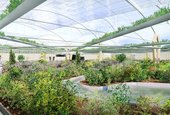
Netherlands CO2040
What key projects are necessary to make the Netherlands CO2 neutral in 2040? That was the central and massive question put before Except and Posad by the Dutch ministry.
By applying network and system-analysis a surprising single answer was found: a more transparent, decentralized and accessible data-system is needed to make this happen.
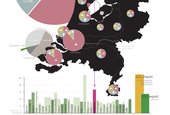
DNV Waste Water Chains
This project is a visual exploration of the Dutch waste water sector in 2030. It takes a closer look at the role of waste water processing facilities for the provision of clean water, renewable energy, and valuable material inputs for society of the future.
The vision for 2030 concerns the role of waste water management in four major parts of society: the built environment, agriculture, industry, and natural lands.
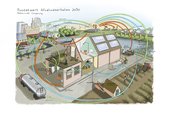
Sustainable Water Innovation Game
SWIG is a social cardgame with a sustainable wastewater processing theme. Players get to know each other, learn from each other, and discover as a group to invest in the opportunities that make wastewater processing more sustainable.
We developed the game mechanics in close collaboration with Det Norske Veritas (DNV) as part of their Wastewater Chain Roadmap (Routekaart Afvalwaterketen). The game is played with much enthousiasm in DNV's workshops today.
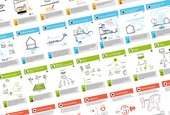
District heating vision Tilburg
This project researches a sustainable district heating system in the Dutch city of Tilburg, developed with our consortium partners.
The vision includes both ecological and social sustainability, and functions as the starting point for all parties involved to cooperate toward a sustainable and carbon neutral heat provision.
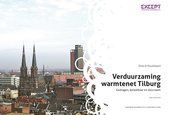
Infographic: Wind and Local Economy
For Eneco Wind we visualized the local impacts of wind turbine development in a visual infographic. The graphic is used by Eneco Wind in conversations with local stakeholders, and helps to guide the conversation to address all topics and impacts. Using the graphic to guide the conversation, all parties become well informed before deciding on wind turbine development.
By providing honest and complete information Eneco Wind aims to increase support for wind energy from local stakeholders.
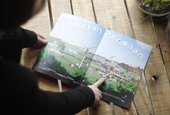
Opportunity Map Waste Water
The Opportunity Map Wastewater Processing is a visualisation of the twelve most important sustainable opportunities within wastewater processing. Users will see and discover sustainable opportunities in their municipality or region and find examples to help them.
The result is an opportunity map that was presented at the Hier Opgewekt congres to the state minister Wilma Mansveld. It was made for the Roadmap Wastewater management towards 2030 with: The Association of Regional Water Authorities, Vereniging van Nederlandse Gemeenten and Det Norske Veritas (DNV).
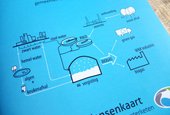
Food for the Urbanite
This research project investigates how the city dweller influences the food system. It investigates new disruptive developments, and proposes actionable steps forward to improve consumer connectivity to the food system. This improves the relation between actual demand for healthy and honest food, and the food system at large.
The research booklet is downloadable for free (in Dutch).
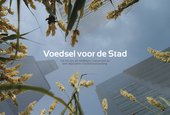
Carpet sector roadmap
Together with MODINT and DNV we mapped the Dutch carpet sector and developed a road map to a circular carpet industry in 2030. We used system mapping and visualization techniques to bring at-a-glance insight to the stakeholder meetings. With this insight we plotted interventions to transition the industry towards a circular and bio-based industry within two decades.
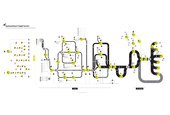
Meat Sector Roadmap
We developed a roadmap of the Dutch meat process sector, production and processing companies and their suppliers, together with DNV. The road map shows opportunities for optimal use of all energy and material flows in the product chain of chicken, pork and beef, and maps their sources. The maps bring insight to all stakeholders involved, and enables decisions on improving entire sections of the production chain at once.
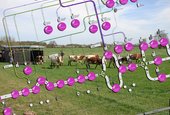
MWH Global waste water
This project illustrates examples of domestic waste water use. By showing simple sketches of complex systems, the illustrations create understanding of pressure sewage, natural filtering, and mini filtering.
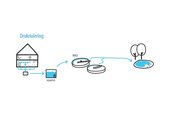
Trade mission Detroit
In cooperation with the Dutch Foreign Office we organized the trade mission to Detroit of May 2015 for over 25 organizations. The program established new permanent business partnerships of Dutch agri- and horticulture, and innovation companies with their American business, governmental and community development counterparts. Detroit, a former powerhouse of the automotive industry, has suffered from deindustrialization, a decline in population, an increase in crime, and general decay. Yet, Detroit is a city full of resources and opportunities.
The event launched Detroit Urban Regen which aims to revitalize the city using smart agricultural solutions and creating a new biobased industry. 22 written pledges of commitment where secured, adding to the existing 15 international partners for Detroit Urban Regen.
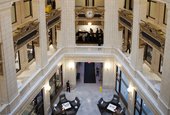
Polydome Arkna
Will Estonia be the first proud owner of a Polydome sustainable agriculture system in the world? During the second half of 2015 we researched the feasibility of a Polydome in the Arkna Eco Park. Our study and supporting business plan were funded by Horizon 2020.
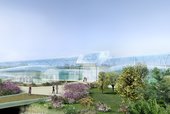
Arkna Eco-Park Masterplan
In Rakvere, Estonia, we developed the masterplan for the 671 Ha self-reliant Arkna Eco-Park. The park is built on a historical site tracing back to 1527, and becomes a primary tourist destination in the country, including a Polydome sustainable agriculture system.
We worked with Arkna Eco-Park to build a complete masterplan template for years to come, including its marketing strategy, identity, logos and brochures, closed loop metabolism, food system, event program, and design guidelines.
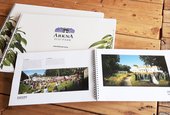
Schiphol Catalyst Office Innovation
We’re working with Schiphol Real Estate and more than 70 stakeholders and experts on boosting sustainability and performance of the Schiphol Central Business District with the concept of a Catalytic multi-tennant office design.
The project realizes an integrated sustainable and self sufficient area, that is a healthy and inspiring place to work, with a footprint of over 20.000 m2 in an unprecedented sustainable and future proof building.
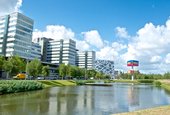
Natural Capital is Business
Natural Capital plays a title role in our economy. To help you clarify the relationship between your economic activities and Natural Capital, Except and NXTE developed the Natural Capital Quick Scan. The scan delivers instant insight and suggests dozens of ways to mitigate risks and pick up on opportunities.
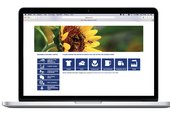
Serenity Farms
Serenity Farms is a concept for a sustainable 110ha greenhouse facility for profitable food production in arid climates. The first site is to be located on the west coast of Saudi Arabia, under the vision of the Reza Investment Company. It will be the largest sustainable greenhouse operation in the world. The only water it uses is salt water sourced from the red sea, and is powered entirely by the sun. The core of Serenity Farms is a high tech food production solution that provides fresh fruits and vegetables for 170.000 people.
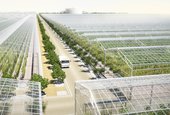
Contact
Jeroen van der Vlist
Chief Operating Officer (COO)
 +31 10 7370215
+31 10 7370215
